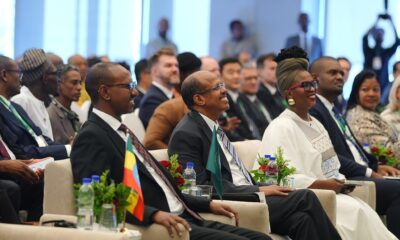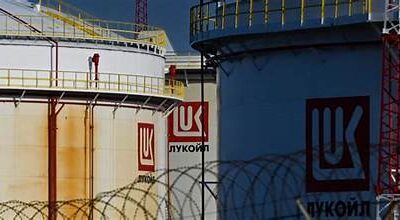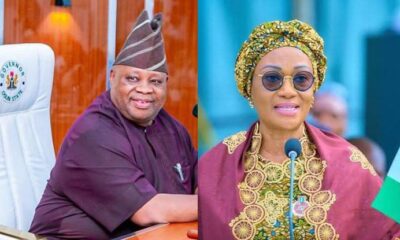Political Issues
Tomorrow and After -By Sylvester Akhaine

TOMORROW! Baring last minute scuttling of the electoral process by self-serving and conceited enemies of Nigeria, Nigerians will take their collective destiny in their hands by choosing a president to run the affairs of the country among the contenders for the highest office in the land. It will be the climax of several months of intrigues, acrimonious and largely non-issues-based campaign by the contending parties, especially the incumbent People’s Democratic Party (PDP) and the leading opposition All Progressives Congress (APC). The choice before Nigerians is whether to continue with the prevailing state of affairs as they are today or choose a new leadership that perhaps will seek to change the current state of affairs. Next, what
is the state of the nation today?
I shall use two basic categories to draw attention to the state of the nation, namely politics and economy. Both overlap and first, the economy. From cradle to grave, man constantly seeks to survive hence the primacy of production. The reality is that many Nigerians are not able to feed themselves, much less contemplate luxury, while a tiny few appropriate the commonwealth. Besides, pursuing the drudgery of eking out existence has been made impossible by the breakdown of law and order and the disarticulation of production.
This reality is not just all about Boko Haram that has taken over the north-eastern swathes of the country and has killed thousands of innocent citizens of our country, sundry social vices hitherto unknown in this country, namely, kidnapping and impunitious assassination of political opponents have become the order of the day. The national treasury has been brazenly looted with officials of government bandying irreconcilable figures. The national currency, the Naira, an element of national power, has been crushed and is already fuelling a second generation brain-drain for a country in search of qualitative manpower. More than ever, the country is outwardly oriented economically and is among the world’s highest importers of generators, rice and sundry goods. The refineries have refused to work as a result of a cabal of importers of refined petroleum
products in the absence of political will to do what is right. Graduate unemployment is spiralling and with no genuine productive generation of employment opportunities.
Under the watch of IMF/Bank surrogates, the woes of the national economy are legion but the long and short of the story is that the nation is broke and many states and federal institutions are barely able to pay workers’ salaries with the backlog of arrears. This is the result of a long term absence of balanced budgeting and the reification of a monocultural economy.
What about politics or the political? Political sovereignty is meaningless. A most warped and backward elite presides over the
polity; men and women of low estimation and armed thugs who cannot be trusted with the position of an office messenger are trusted into affluence, and the leadership of the incumbent administration run the country on a primordial ideology of religion and ethnicity, for a country badly in need of unity. The existing political parties are ideologically barren and routinely impose candidates without the least consideration for merit.
Votes do not count as elections are also routinely rigged. Political office holders at all levels revel in padded salaries, the only traction for seeking election. Without a national creed, the grand element of loyal opposition is completely absent in the polity.
Political actors are only loyal to themselves and not to the nation. The once respected Nigerian army has been politicised and corrupted by profession-vitiating luxuries and cannot wage battles against rag-tag hoodlums while the country has been reduced to a banana republic in a continent where the country is expected to lead. Nigeria has become ridiculously a tuft for intelligence gathering by foreign Intels and fortune-seeking mercenaries.
In the context of the foregoing, tomorrow’s election will be influenced by five factors, namely, sentiment, perception,
rationality, demographics and fraud. Sentiments will arise from then mainstreaming of religion and ethnicity by the incumbent, but it is by no means decisive. Perception is a strong factor. Perception of the incumbent relative to performance will sway the electorate either way, while rationality will flow from a logical appraisal of the prevailing objective conditions and enlightened self-interest. This is what rational choice entails. An alliance between the leading fragments of Hausa-Fulani and the Yoruba is hardly beatable. It is demographically formidable. This variable will be at play tomorrow. The desperation of the leading contenders is bound to spawn some fraudulent practices. This may rob off on the integrity of the exercise. I guess INEC is equal to the task.
AFTER THE ELECTION. The electoral outcome matters. Perception that the election is rigged against the APC flag bearer will spark off violence especially in the northern half of the country where the APC flag-bearer has fanatical supporters. The non-virtuous campaign of the leading parties has already prepared the ground for this eventuality, besides a customary and historical inclination to violence in the North. Of course, the incumbent will not be able to govern with legitimacy. If the result swings in favour of the opposition, there will be widespread jubilation and with a domino effect on subsequent elections in April. Attempts by the so-called Niger-Delta militants to resume hostility against the state will incur the full wrath of the Nigerian state. The reason is that the behaviour of its self-acclaimed leaders has robbed them of any form of legitimacy and empathy they had earlier enjoyed. An opposition victory will be healthy for the polity. The mere fact that it is possible to defeat incumbents, even in strong authoritarian states is good for democratic consolidation and people power. It consigns to the dustbin of history Pascal Lissouba’s assertion that incumbents don’t lose election in Africa. There is already a trend in this regard in West Africa. Presidents Jerry Rawlings and Abdul Diouf of Senegal were defeated in 2000 by the opposition. Again in Senegal, President Abdulaye Wade was removed by the opposition in 2012.
A victorious General Buhari will be expected to move from a traditional mindset to modernity in the running of the affairs of the country. He will be expected to restore security in the short term and sustained thereafter, to restore power through the pursuit of energy democracy that will disaggregate the national transmission and tap from a variety of alternative energy sources. He will be expected to stop importation of fuel by the building of modular refineries in the near term, and encourage the building of private refineries and collectivisation of the so-called illegal refineries by the locals of the Niger-Delta.
Steps to curb corruption must be immediate and employment generation must be prioritised, and it should not be distributive but productive. Government overall business must be anchored on nationalism and pan-Africanism. But an incumbent victory may mean business as usual. The country is bleeding; it is not what is required in these times. Nigerians should be guided by rationality based on the facts on the ground. This is no time to live a lie.
Dr. Akhaine, author of the new book, Patrons of Poverty is a visiting member of the Guardian Editorial Board.











